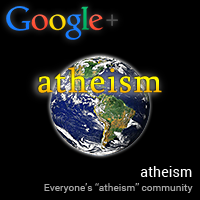Definitions of "atheism" and "atheist"
For the mostpart the following definitions are nearly identical, yet have distinctly separate definitions because maintaining the accuracy of their meanings and uses is important for communicating clearly and accurately, which is why both the descriptive and prescriptive aspects are covered.
Please also see our research references for relevant academic and non-academic sources, and our collection of quotations for examples of normativity by way of common usage.
atheism
noun
/'āTHē,izəm/
absence of belief in deities
- Linguistic structure
- Absence is indicated by the alpha privative ("a-" prefix), meaning "without" or "not," hence "atheism" is therefore concisely characterized as "without theism" or "not theism" respectively.
See also: Lack of belief in gods (educational YouTube video; 10 minutes)
- Etymological support
- The word "atheism" is derived from the Ancient Greek word "ἄθεος"4 ("átheos") meaning "godless" or, to emphasize it more generally, "without deities."
See also: https://www.define-atheism.com/etymology/
- Onus of Justification (a.k.a., Burden of proof)
- Since the "atheism" classification is not justified by claims for or against theistic or anti-theistic positions, the burden of proof is not applicable in regard to this. Although it's certainly possible to have reasons for choosing atheism, such justification is optional but not necessary.
- Logical consistency
- Assuming that ¬ = is not, B = believing, and D = deities, atheism is logically characterized as "¬BD = not believing in deities" which is equivalent to "absence of belief in deities" or "not believing in deities."
See also: https://www.define-atheism.com/logic/
- Further clarification
- For the sake of completeness, and due to the wide-spectrum of theistic deity-dependent concepts (including supernatural agents - such as angels and demons - which don't qualify as goddesses or gods), "atheism" may also consequently be classified implicitly as the "absence of belief in deities and [theistic deity-dependent] supernatural agents."
- Synonyms
- non-theism; deitylessness; godlessness; heathenry (archaic); non-worship (contextual); unbelief (contextual)
- Polysemous variation
- The polysemous characteristic is a descriptive principle favouring usage that may vary among speakers, and so some alternative meanings of the word "atheism" can occasionally lead to misunderstandings by limiting definitional scope or becoming conflated with other words that are more suitable.
See also: https://www.define-atheism.com/polysemy/
atheist
noun
/'āTHē,ist/
absent of belief in deities
- Linguistic structure
- Absence is indicated by the alpha privative ("a-" prefix), meaning "without" or "not," hence an "atheist" is therefore concisely characterized as "not a theist."
See also: Lack of belief in gods (educational YouTube video; 10 minutes)
- Etymological support
- The word "atheist" is derived from the Ancient Greek word "ἄθεος"4 ("átheos") meaning "godless" or, to emphasize it more generally, "without deities."
See also: https://www.define-atheism.com/etymology/
- Onus of Justification (a.k.a., Burden of proof)
- Since the "atheism" classification is not justified by claims for or against theistic or anti-theistic positions, the burden of proof does not apply to atheists in regard to this. Although it's certainly possible to have reasons for choosing to be an atheist, such justification is optional but not necessary.
- Logical consistency
- Assuming that ¬ = is not, B = believing, and D = deities, an atheist is logically characterized as "¬BD = not believing in deities" which is equivalent to being "absent of belief in deities" or "not believing in deities."
See also: https://www.define-atheism.com/logic/
- Further clarification
- For the sake of completeness, and due to the wide-spectrum of theistic deity-dependent concepts (including supernatural agents - such as angels and demons - which don't qualify as goddesses or gods), an "atheist" may also consequently be classified implicitly as being "absent of belief in deities and [theistic deity-dependent] supernatural agents."
- Synonyms
- non-theist; deityless; godless; heathen (archaic); non-worshiping (contextual); unbelieve (contextual)
- Polysemous variation
- The polysemous characteristic is a descriptive principle favouring usage that may vary among speakers, and so some alternative meanings of the word "atheist" can occasionally lead to misunderstandings by limiting definitional scope or becoming conflated with other words that are more suitable.
See also: https://www.define-atheism.com/polysemy/
Please also follow us on Google+.
![[D.A. logo]](/images/logo-da-small.png)
![[Chinese word for: atheism -- Wu Shen Lun)]](/images/chinese-word-for-atheism.png)



